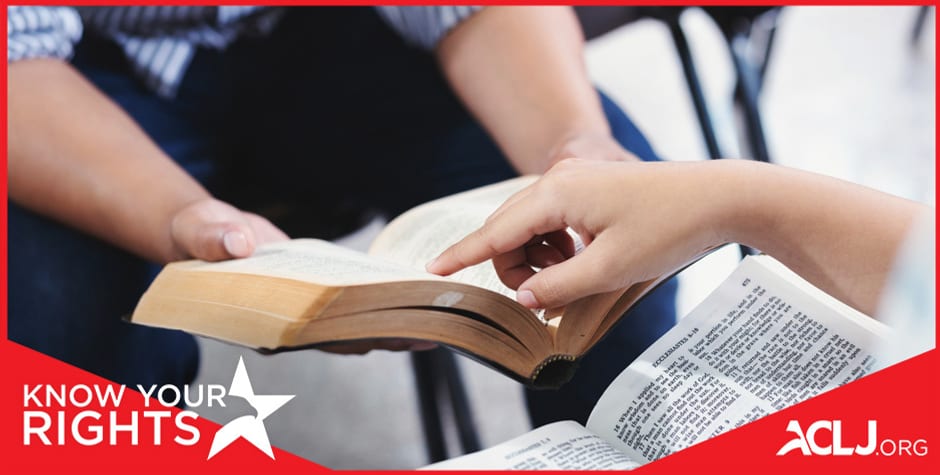Know Your Rights: Sharing Your Faith and Witnessing Are Protected From Government Intrusion by the U.S. Constitution
Over the years, many Americans have wondered what they may or may not do when it comes to sharing their faith or witnessing in public. Though there is not a one-size-fits-all answer, the ACLJ has written a legal memo addressing many of the most common questions Christians often ask.
Most importantly (and as discussed in our memo):
The First Amendment free speech clause reads, “Congress shall make no law . . . abridging the freedom of speech,” and the Fourteenth Amendment states, in part, “[N]or shall any State deprive any person of life, liberty, or property, without due process of law . . . .” The U.S. Supreme Court has ruled that these two Constitutional provisions severely limit the power of federal, state, and local governments to interfere with speech activities on sidewalks, streets, and in parks.
In our memo, we explained that the distribution of free religious literature is a form of expression protected by the First Amendment. As the U.S. Supreme Court wrote:
The hand distribution of religious tracts is an age-old form of missionary evangelism – as old as the history of printing presses. It has been a potent force in various religious movements down through the years. . . . It is more than preaching; it is more than distribution of religious literature. It is a combination of both. Its purpose is as evangelical as the revival meeting. This form of religious activity occupies the same high estate under the First Amendment as do worship in the churches and preaching from the pulpits.
Our memo also highlighted the fact that giving away free Gospel tracts and talking to people about salvation are not the same thing as soliciting! In fact, one may hand out Gospel tracts to the public on any publicly owned street, sidewalk, or park. In legal terms, streets, sidewalks, and parks are called traditional public forums, and the U.S. Supreme Court has held that a traditional public forum is government property that is traditionally open to public speech.
Also discussed in our memo is the fact that airport terminals, subway systems, and public sidewalks surrounding the U.S. Supreme Court building may be appropriate locations for leafletting and other First Amendment free speech activities (subject to local laws and ordinances).
In our memo, we also noted that a state may enforce “regulations of the time, place, and manner of expression which are content-neutral, are narrowly tailored to serve a significant government interest, and leave open ample alternative channels of communication.” A state may enforce, for example, a rule against parades between sunset and sunrise as a reasonable time, place, and manner restriction.
We further noted that witnessing on a public street and loitering are not the same thing. As the U.S. Supreme Court explained, an ordinance “with no apparent purpose . . . is inapplicable to assemblies that are designed to demonstrate a group’s support of, or opposition to, a particular point of view.” Hence, evangelizing is a legitimate purpose for standing on a public sidewalk.
We concluded this section of our memo with a few important recommendations. First, devote time to prayerful preparation. Second, select a location and pray for the surrounding area. Third, check the local government website for the rules applicable to your First Amendment activities. Print the rules and keep them on hand. When in doubt, confer with local police.
Though our memo focused primarily on First Amendment protections applicable on public property, such as streets, sidewalks, and parks, we also briefly discussed the way in which First Amendment and state constitutional protections may (or may not) be applicable on privately owned property.
We explained that First Amendment protections generally do not apply to those on private property. However, some state constitutions may provide more expansive constitutional protections than the First Amendment. We also emphasized that an owner of private property may choose to allow First Amendment free speech activity on the property.
In sum, the ACLJ is dedicated to defending your constitutional rights. We have been providing assistance and legal representation, at no cost or charge, to people just like you for decades. If your rights are being violated in this area, please contact us at ACLJ.org/HELP.
Learn more about your constitutional rights at ACLJ.org/Know-Your-Rights.
